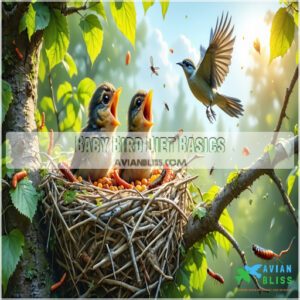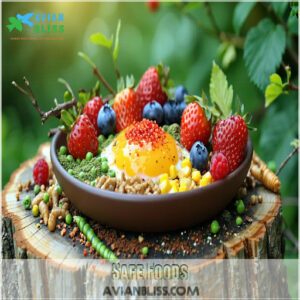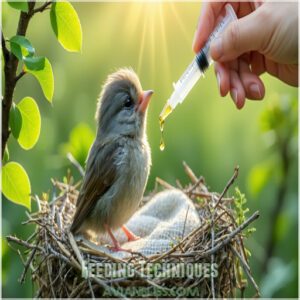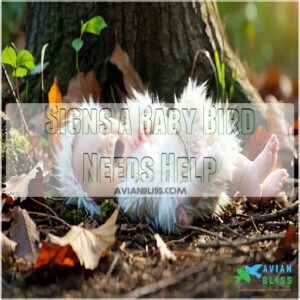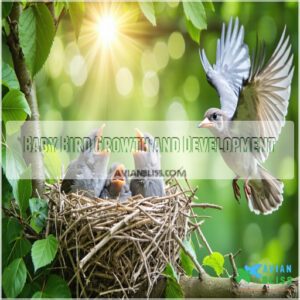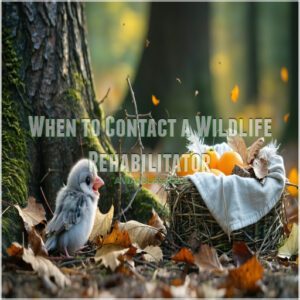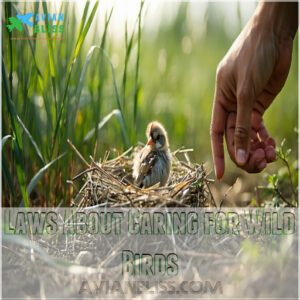This site is supported by our readers. We may earn a commission, at no cost to you, if you purchase through links.
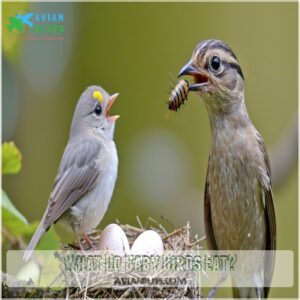
Most baby birds thrive on soft insects like mealworms, mashed fruits, and veggies—think finely chopped apples or mashed peas. For extra protein, even crumbled, cooked egg works!
Just be sure the pieces are small enough to swallow without choking. Skip harmful foods like salted nuts, apple seeds, or anything moldy.
If you’re helping an orphaned bird, feed them every 20 minutes and keep it mushy but not watery. Curious about species-specific tips? Each bird has its own menu!
Table Of Contents
- Key Takeaways
- What Do Baby Birds Eat?
- Baby Bird Diet Basics
- Feeding Orphaned Baby Birds
- Signs a Baby Bird Needs Help
- Baby Bird Growth and Development
- Observing Baby Birds in Nature
- When to Contact a Wildlife Rehabilitator
- Laws About Caring for Wild Birds
- Frequently Asked Questions (FAQs)
- What do baby birds eat?
- How to feed baby birds for the first time?
- Do baby birds eat from humans?
- Should you feed a baby bird?
- What can I feed to baby birds?
- How to take care of an abandoned baby bird?
- Can a baby bird survive without its mother?
- Do baby birds drink water?
- How to feed a wild baby bird?
- How many hours a day do baby birds eat?
- Conclusion
Key Takeaways
- Focus on protein-rich foods like mealworms, boiled eggs, or softened dog kibble to meet baby birds’ nutritional needs.
- Avoid feeding harmful items like bread, milk, salted nuts, apple seeds, or anything moldy to protect their natural feeding rhythm and prevent choking by not giving them harmful items.
- Feed tiny, mushy portions every 10-20 minutes to match their natural feeding rhythm and prevent choking.
- If the bird is injured or abandoned, contact a licensed wildlife rehabilitator immediately for expert care.
What Do Baby Birds Eat?
Ever wonder why you can’t just toss breadcrumbs to a baby bird?
Their wild diet is surprisingly complex.
These tiny creatures need protein-packed meals every 10-20 minutes to fuel their rapid growth.
In nature, parent birds deliver a menu rich in insects – think caterpillars, mealworms, and other crawling protein sources.
While seeds and fruits might seem like obvious baby bird food, they’re actually secondary to these high-protein snacks.
Even species that grow up to be seed-eaters start life needing insect-based nutrition.
A newborn bird diet mirrors what works in nature: protein-rich, easily digestible, and frequently delivered.
Understanding baby bird diets is essential for their growth and development, especially when considering human intervention.
Baby Bird Diet Basics
The protein-rich foundation of baby bird nutrition starts with frequent, small meals.
Young birds need feeding every 15-20 minutes, packing their growing bodies with nature’s power foods.
Your baby bird’s diet should mirror what they’d get in the wild – think of it as their personal protein shake schedule.
- Picture tiny beaks opening wide for mouthfuls of nutritious insects
- Watch their eyes light up at the sight of protein-rich morsels
- See their feathers grow stronger day by day
- Notice their increased activity levels after each meal
- Observe their natural foraging instincts develop
Remember these diet basics:
- Tailor food to their species
- Focus on protein-packed options
- Follow nature’s feeding rhythm
- Match meals to growth stages
- Keep nutrition balanced
Proper nutrition is fundamental for the growth and development of baby birds, and understanding baby bird nutrition is essential for their overall health and well-being.
Feeding Orphaned Baby Birds
If you’ve found an orphaned baby bird, you’ll need to act quickly with the right foods and feeding techniques to guarantee its survival.
You’ll discover that these vulnerable creatures require specific diets based on their species and age, from protein-rich insects for songbirds to specialized formulas for doves.
Safe Foods
Getting the right baby bird food can make a huge difference for their survival.
So, what do baby birds eat? A mix of nutrient balance and food variety is the way to go.
| Here’s a quick table to guide you: | Food | Prep | Why It Works | Benefit |
|---|---|---|---|---|
| Mealworms | Live or softened | High protein source | Mealworm safety, easy to feed | |
| Fresh fruits | Finely chopped, like berries | Natural sugar & vitamins | Boosts energy | |
| Cooked eggs | Crumbled | Protein-packed | Fuel for growth | |
| Soft veggies | Mashed peas, corn | Fiber, essential nutrients | Supports digestion |
Understanding safe bird food options is essential for their development.
Stick to natural, healthy options, but keep food tiny for easy swallowing.
Picking the right types of baby bird food gives nature a helping hand, and for more information, you can visit safe bird food resources.
Unsafe Foods
Wondering what not to feed baby birds? Some common foods are downright dangerous.
Baby birds can’t handle certain human staples, so skip the milk—it’s no substitute for mama bird’s care. Rotten eggs or spoiled milk might sound like scraps, but they can make birds seriously ill.
Likewise, moldy fruits or toxic seeds pose real threats. Understanding toxic bird seeds is essential for their safety.
- Toxic seeds (e.g., apple seeds, cherry pits).
- Moldy fruits or vegetables.
- Bad nuts (especially salted or flavored).
- Rotten eggs or spoiled milk.
Stick with safe foods to protect your little rescue.
Feeding Techniques
Feeding nestlings or fledglings might feel tricky, but the right tools and techniques simplify it.
Use a small syringe or dropper—essential Feeding Tools—to mimic parental feeding.
Always moisten food into a mushy, easy-to-swallow consistency; think baby bird oatmeal.
Tilt the head gently and let the beak naturally open, feed slowly to avoid choking.
Stick to frequent intervals, like every 20-45 minutes, and watch their body language for signs they’ve had enough.
Consistency and care secure proper Baby Nutrition, understanding Baby Bird Food options is vital for their development and survival.
Signs a Baby Bird Needs Help
Spotting signs a baby bird needs help takes a sharp eye and some patience.
Is the bird struggling to stand or keep its feathers smooth?
Fluffed-up feathers might mean it’s cold, and wandering around could signal it’s lost.
Check for Bird Injury Signs like matted feathers or blood.
Watch for parental return before intervening—birds often seem abandoned but aren’t.
If it’s lethargic or gaping constantly, the bird may need immediate Nestling Care or Wild Bird Rescue.
Call a pro if unsure.
- A tiny bird shivering in the wind.
- A fledgling stuck in a risky spot.
- A nestling calling out endlessly.
- A limp body that breaks your heart.
Baby Bird Growth and Development
Understanding how baby birds grow helps you support their nutritional needs during the nestling and fledgling stages.
These stages involve rapid development, from gaining feathers to learning to fly, requiring a diet rich in proteins and energy.
Nestling Stage
Nestlings are tiny, featherless, blind, and totally dependent on their parents—it’s nature’s definition of a full-time job.
These fragile little birds, often the size of a thumbnail, grow at lightning speed, nearly doubling in size every couple of days.
Parents bring 150 protein-packed meals daily, feeding soft insects, worms, and other nestling bird food every 10-20 minutes.
This frequent feeding is essential for Baby Bird Nutrition and Nestling Health during this intense growth spurt.
Understanding Baby Bird Food options is essential for supporting their development.
Here’s how to spot a nestling:
- Featherless or just sprouting wisps
- Mostly immobile, relying solely on the nest
- Closed or barely opened eyes
- Weak chirps calling for care
Nestlings require dedicated, round-the-clock Nestling Care!
Fledgling Stage
The fledgling stage is a bird’s thrilling “training wheels” phase.
They’re like little adventurers, hopping around with their freshly feathered wings and testing short, clumsy flights.
While parents keep watch, fledglings learn survival basics like foraging and flying.
| Time Period | Physical Changes | Behavior Changes |
|---|---|---|
| Week 1 | Fluffy feathers, short flights | Ground exploration, begging |
| Week 2 | Stronger wings | Follows parents, brief flights |
| Week 3 | Feather growth complete | Tries foraging independently |
| Week 4 | Looks adult-like | Solo flights, less parent time |
During this phase, fledgling care includes observation and ensuring they’re safe from predators while mastering their fledgling bird diet.
Observing Baby Birds in Nature
How do baby birds grow into confident fliers? By mimicking their parents’ every move.
From cracking seeds to catching insects, fledglings observe and practice survival skills like food hunting and predator evasion.
You might spot them hopping between branches, testing their wobbly wings as they build strength.
For more information, explore this helpful resource on baby bird development stages.
Watching from a distance is key—your quiet observation allows you to witness this incredible process without interfering.
Their fluffy feather growth signals readiness for bigger adventures, while their natural routines, like wild encounters and nesting habits, adapt as they learn life’s challenges.
Nature’s classroom is best left undisturbed.
When to Contact a Wildlife Rehabilitator
That baby bird you’ve been watching might need more help than you can give.
If you see signs of injury, like visible wounds, labored breathing, or a broken wing, it’s time to call wildlife experts.
Birds stranded on the ground for hours without parents nearby could also need emergency care.
Wildlife rehabilitators specialize in baby bird care and bird rescue, offering advice and rehab services when the situation gets tricky.
Don’t know what to feed baby birds or when to feed a baby bird? They’ll guide you.
Keep the bird safe in a quiet box, and let professionals handle the rest—quick action can save a life.
Laws About Caring for Wild Birds
Helping wild birds isn’t just about kindness—it’s also about following the rules.
Laws like the Migratory Bird Treaty Act safeguard native species through strict regulations.
Without a permit, it’s illegal to handle or keep protected birds, even with good intentions.
Ignoring these rules could harm birds more than help.
Here’s what you need to know:
- Disturbing Nests: Moving nests or fledglings disrupts their development and violates wildlife protection laws.
- Caring for Injured Birds: Only licensed wildlife rehabilitators can provide appropriate bird care and rehabilitation.
- Legal Risks: Keeping wild birds without authorization risks fines and damages bird conservation efforts.
Always prioritize animal welfare—connect with professionals for proper wildlife rescue.
Frequently Asked Questions (FAQs)
What do baby birds eat?
Caring for baby birds is like hosting picky eaters—they thrive on soft, high-protein meals like mealworms, boiled eggs, or soaked cat kibble.
Avoid bread and milk; those aren’t on their natural menu!
How to feed baby birds for the first time?
Start by moistening dog kibble or offering soft foods like mealworms or boiled eggs.
Use a small syringe or tweezers, placing food gently into the beak as they open it naturally—don’t force-feed!
Do baby birds eat from humans?
Sure, they can—if you’ve got the right food and approach.
Baby birds will accept prepped meals like softened dog kibble or mealworms.
Keep it gentle and safe; their tiny trust shouldn’t get broken!
Should you feed a baby bird?
You shouldn’t rush to feed a baby bird.
First, identify if it truly needs help.
Healthy nestlings belong back in their nest, fledglings may just need space, and improper feeding can do harm.
What can I feed to baby birds?
You can offer soaked dog kibble, boiled eggs, or mealworms to baby birds.
Chop food small enough to swallow.
Avoid bread or milk—those can harm them.
A little warmth and care go a long way!
How to take care of an abandoned baby bird?
Caring for an abandoned baby bird is like being its lifeline.
Gently place it in a quiet, safe box, keep it warm, and contact a wildlife rehabilitator.
Avoid overhandling to reduce stress and injury.
Can a baby bird survive without its mother?
A baby bird can survive without its mother if you step in quickly.
Keep it warm, feed it protein-rich soft foods like moistened dog kibble or mealworms.
Contact a wildlife rehabilitator for expert advice.
Do baby birds drink water?
When push comes to shove, baby birds don’t typically drink water directly.
They get hydrated through their food, like insects or moist meals.
Offering water in shallow, safe dishes works only for older fledglings.
How to feed a wild baby bird?
Use a plastic syringe or tweezers to gently feed mushy, high-protein food like soaked dog kibble or boiled eggs.
Always wait for the bird to open its beak naturally, and feed slowly.
How many hours a day do baby birds eat?
Think feeding a baby bird is a part-time gig?
Nope! Those little fluffballs demand food every 15-20 minutes from sunrise to sunset.
It’s like running nature’s hungriest daycare—packed with worms and chaos!
Conclusion
Picture a tiny diner: every baby bird has a specific menu, from insects to fruits.
Knowing what baby birds eat can make all the difference if you’re helping one out.
Stick to soft, safe foods and skip anything risky like seeds or processed items.
Watch their behavior—constant chirping or lethargy may mean trouble.
Your quick care can save a little life, but don’t hesitate to call a wildlife rehabilitator if things get tough or uncertain.
- https://www.reddit.com/r/WildlifeRehab/comments/15q6qun/orphaned_baby_bird_what_do_i_feed_him_and_how/
- https://ourhabitatgarden.org/home/creatures/birds/young/feeding/
- https://wildwatch.org/feeding-baby-birds/
- https://www.birdfy.com/blogs/blogs/feeding-fledglings-a-guide-to-feeding-baby-birds
- https://www.rspb.org.uk/about-the-rspb/about-us/media-centre/press-releases/baby-birds-2020/

